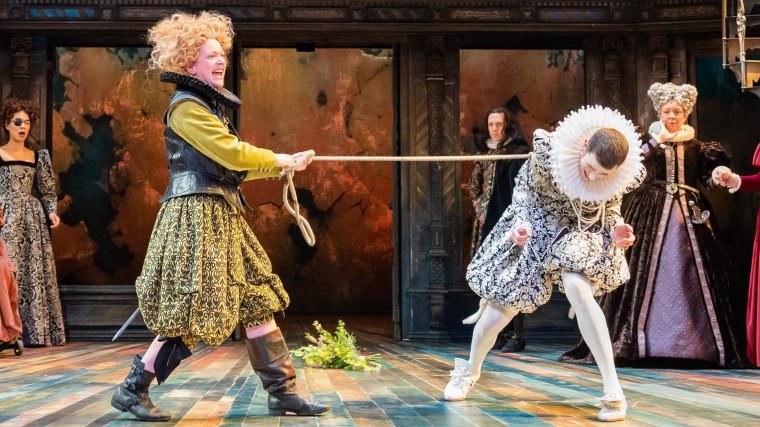1590s. England is a matriarchy. These five words sum up fantastically how director Justin Audibert turned this problematic play by Shakespeare on its head, with great results.
As suggested by making England a matriarchy, the genders in this RSC production of The Taming of the Shrew were all swapped, so Baptista Minola, a gentlewoman, wants to marry her sons to the highest bidder, but insists that her younger son, Bianco, may not marry before his older brother, Katherine, the eponymous shrew. Petruchia, a friend of one of Bianco’s many suitors, vows to woo Katherine for his dowry and for the challenge of overcoming his fearsome reputation.
There were many standout performances in this production. Claire Price was a feisty Petruchia who still managed to be likeable despite her cruelty towards Katherine. There was plenty of humour amongst Bianco’s suitors, particularly Sophie Stanton as Gremia gliding across the stage. I also enjoyed James Cooney’s hair flicking and flirtation as Bianco.
The costumes, designed by Hannah Clark, were beautiful. I particularly liked the costumes that combined traditional ‘male’ and ‘female’ costumes from the 16th century, such as Petruchia and Katherine’s wedding outfits

It is still a troublesome play – the cruelty was still evident even when it was a woman abusing a man. However, I think gender swapping is the only way the play can ‘work’ successfully in modern times. Some of the line changes created a lot of humour, such as
I am ashamed that men are so simple
while others, such as
Why are our bodies soft and weak and smooth
didn’t always work. I also felt that Joseph Arkley as Katherine was a fairly timid shrew. Apart from one instance of trying to cut off Bianco’s hair, it didn’t seem that a lot of taming was required. Nevertheless, these are minor quibbles. This was a fantastic production and not to be missed on tour or at the Barbican.

